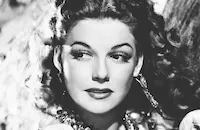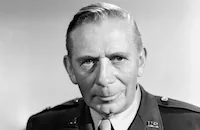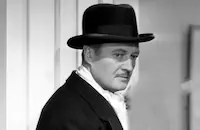Good Sam

Brief Synopsis
Cast & Crew
Leo Mccarey
Gary Cooper
Ann Sheridan
Ray Collins
Edmund Lowe
Joan Lorring
Film Details
Technical Specs

Synopsis
Inspired by Reverend Daniels' Sunday sermon on charity and goodness, compulsive do-gooder Sam R. Clayton offers his neighbors, the Butlers, the use of his car for their one-day vacation after their own car breaks down. Sam's kindness annoys his good-natured wife Lu, who protests the gesture with a string of sarcastic barbs. Lu also protests the continuing presence of her deadbeat brother Claude, an ex-serviceman who, at Sam's insistence, has been sponging off of them for six months. That night, the Butlers call to inform Lu that they are keeping the car for an extra day, and the next morning, Sam is forced to pay mechanic Mr. Nelson for fixing the Butlers' car. Much to Lu's frustration, Sam also invites the chatty Nelson to breakfast and cajoles her into agreeing to prepare goose grease for Nelson's asthmatic wife. Later at the department store where Sam is the general manager, his boss, H. C. Borden, scolds him for spending too much time conversing with the customers and not pushing the Christmas merchandise. Dismissing Borden's complaints, Sam then comforts Shirley Mae, a young music department clerk, who is seriously depressed because her married lover has dumped her and left her homeless. That night, Nelson and his wife show up at Sam's house and all but invite themselves to dinner. During the meal, Mrs. Nelson, who is a real estate agent, mentions that a wonderful house may go on the market, exciting Lu about the possibility of finally buying her own home. Sam is then called to see the Adamses, a young couple to whom he loaned money when Mrs. Adams discovered she was pregnant and was considering an abortion. The Adamses tell Sam that, even though the gas station they bought with his money is now a success, they can repay him only in small installments because they have invested in a house for themselves and their soon-to-arrive baby. Although understanding, Sam feels frustrated about the money and announces to Lu, who knows nothing about the Adamses' loan, that he is finally "through with people." He then begins to denounce the Butlers, unaware that the family is in his living room, having told Lu that the nearsighted Mr. Butler was in an accident in Sam's car and is being sued by the other party. In addition, because the car is registered to Sam, and Mr. Butler has lost his job, Sam will be forced to pay for all the damages. After Sam throws the Butlers out, Lu suggests that they also throw Claude out and is thrilled when her brother calls to announce that he is leaving to play pool in Cincinnati. Before the couple can enjoy their first night alone together in six months, however, their daughter Lulu interrupts, demanding a bedtime story. Just as Sam and Lu get Lulu to sleep, Claude returns, having changed his mind about Cincinnati, and Shirley Mae, who has taken an overdose of pills, is dropped off by a cab driver who found Sam's address in her pocket. At her wit's end, Lu later confers with Reverend Daniels and confesses that her marriage is in trouble because of Sam's incorrigible goodness. Daniels promises to talk discreetly to Sam, but the next day, a bemused Sam reports to Lu that the reverend's marriage is faltering. Lu's spirits are finally lifted when she takes a tour of her dream house and believes that their $5,000 "nest egg" can be used as a down payment. When Sam reveals that he loaned the Adamses their house savings, Lu breaks down in tears. Then, in the midst of their ensuing argument, Reverend Daniels arrives to discuss a charity bazaar for which Sam has volunteered Lu's services. Although Lu participates in the bazaar, she tells Sam afterward that Borden has offered her a job buying for the store in Europe. As Sam and Lu argue about the offer, they overhear Claude romancing Shirley Mae on the porch, causing Lu to call the clerk an immoral gold digger. A crushed Shirley Mae leaves the house, and to Sam's surprise, the Adamses then show up with a check for $6,000, having sold their gas station for a huge profit. After Sam tells Lu that he will never change, Lu begins to feel contrite, especially after she learns that Claude, who has taken a job at the Adamses' new gas station, has proposed to Shirley Mae. Sam, meanwhile, is put in charge of the store's Christmas charity dinner and is robbed of all his money after he has already paid for the turkeys with part of the house savings. Sam tries to secure a bank loan, but is turned down because of his unstable credit history. Unable to face Lu, who has already moved into the new house and is preparing a celebratory dinner, Sam seeks refuge in a bar. While his family waits nervously for his return, the bank officer who rejected Sam announces to Lu that he has changed his mind about the loan. Just as Lu is about to panic, a very drunken Sam is escorted home by a Salvation Army band, and Sam learns that not only will he receive the loan, but has been made vice-president of the store. A relieved Lu then lovingly embraces her inebriated husband.

Director

Leo Mccarey
Cast

Gary Cooper

Ann Sheridan

Ray Collins

Edmund Lowe

Joan Lorring

Clinton Sundberg
Minerva Urecal

Louise Beavers
Dick Ross
Lora Lee Michel
Bobby Dolan Jr.
Matt Moore
Netta Packer

Ruth Roman
Carol Stevens
Todd Karns

Irving Bacon

William Frawley
Harry Hayden
Irmgard Dawson
Jane Allen
Tom Dugan
Sara Edwards
Ruth Sanderson
Marta Mitrovich
Mimi Doyle
Franklin Parker
Ida Moore
Anne O'neal
Ruth Brennan
Florence Auer
Dick Wessell
Sedal Bennett
James Horne
Ann Duncan
Johnny Duncan
Ronnie Ralph
Peggy Miller
Cliff Clark
Robert Dudley
Hal Melone
Jack Gargan

Bess Flowers
Almira Sessions
Garry Owen
William Haade
Stanley Mckay
George Ovey
Pat Davis
W. J. O'brien
Bert Roach
Bob Tidwell
Dick Elliott
Ann Lawrence
Joe Hinds
Francis Stevens
Charles Williams

Joseph Crehan
Louis Mason
Effie Laird
Frank Pharr
Ted Mapes
Helen Foster

Roger Moore
Ken Terrell
Bert Moorehouse
Jean Andrew
Crew
Louis Anderson
George Barnes
Peter Bernard
John L. Cass
Russell A. Cully
Robert Emmett Dolan
Ken Englund
John B. Goodman
Jesse Hibbs
John Klorer
Jacque Mapes
Leo Mccarey
Leo Mccarey
James Mckay
C. Palmetier
Clem Portman
Wolf Reade
Darrell Silvera
Rev. J. Herbert Smith
Myrl Stoltz
William Travilla
Jack Warren

Photo Collections
Videos
Movie Clip


Film Details
Technical Specs

Articles
Good Sam
Director Leo McCarey was coming off of two major successes (the Oscar®-winning Going My Way (1944) in 1945 and Academy Award-nominated The Bells of St. Mary's (1945) in 1946) when he made Good Sam. The film represented a return to a more comedic style that had helped define his earlier career with such hits as Duck Soup (1933) and The Awful Truth (1937).
Good Sam came along for Gary Cooper at a time when his film career was lagging, and there was hope that this film would help reignite his star power. Although Good Sam was a solid effort, it failed to catch fire at the box office. Cooper, however, did manage to sign a new long-term contract with Warner Bros. during the making of Good Sam and would go on to win his second Academy Award as Best Actor just a few years later with High Noon (1952).
Producer: Leo McCarey
Director: Leo McCarey
Screenplay: Ken Englund (screenplay); Leo McCarey, John Klorer (story)
Cinematography: George Barnes
Art Direction: John B. Goodman
Music: Robert Emmett Dolan
Film Editing: James McKay
Cast: Gary Cooper (Samuel R. 'Sam' Clayton), Ann Sheridan (Lucille 'Lu' Clayton), Ray Collins (Rev. Daniels), Edmund Lowe (H.C. Borden), Joan Lorring (Shirley Mae), Clinton Sundberg (Mr. Nelson), Minerva Urecal (Mrs. Nelson), Louise Beavers (Chloe, Lu's Maid), Dick Ross (Claude, Lu's Brother), Lora Lee Michel (Lulu Clayton).
BW-114m.
by Andrea Passafiume

Good Sam
Quotes
Trivia
Director Leo McCarey shot two different endings and let remarks by preview audiences determine which one to use.
Notes
Hollywood Reporter and Los Angeles Times news items add the following information about the production: Jean Heather was first announced as the film's second female lead. In June 1947, John Goodman replaced William Flannery as art director on the picture so that Flannery could finish work on Dudley Nichols' film Mourning Becomes Electra . Leo McCarey's Rainbow Productions borrowed Ann Sheridan from Warner Bros. for the film. McCarey used a twenty-five-piece high school band, assembled from various Los Angeles schools, for a sequence in the picture. Technical advisor Rev. J. Herbert Smith was the pastor of All Saints Episcopal Church in Beverly Hills, CA. St. James Episcopal Church was used as a model for the film's church interior. In April 1947, Hollywood Reporter announced that locations were being scouted in Arizona and New Mexico, but it is not known if any scenes were actually shot there. In January 1948, McCarey was reportedly shooting two additional scenes for two different endings, from which sneak preview audiences were to select the final ending. The contents of the second ending is not known. Gary Cooper was called away from the production so that he could testify as a friendly witness at the HUAC meetings in Washington, D.C. on October 23, 1947. During filming, Cooper, whose career was floundering at the time, signed a significant contract with Warner Bros. Ann Sheridan reprised her role in a September 25, 1950 Lux Radio Theatre broadcast, co-starring Joel McCrea.














